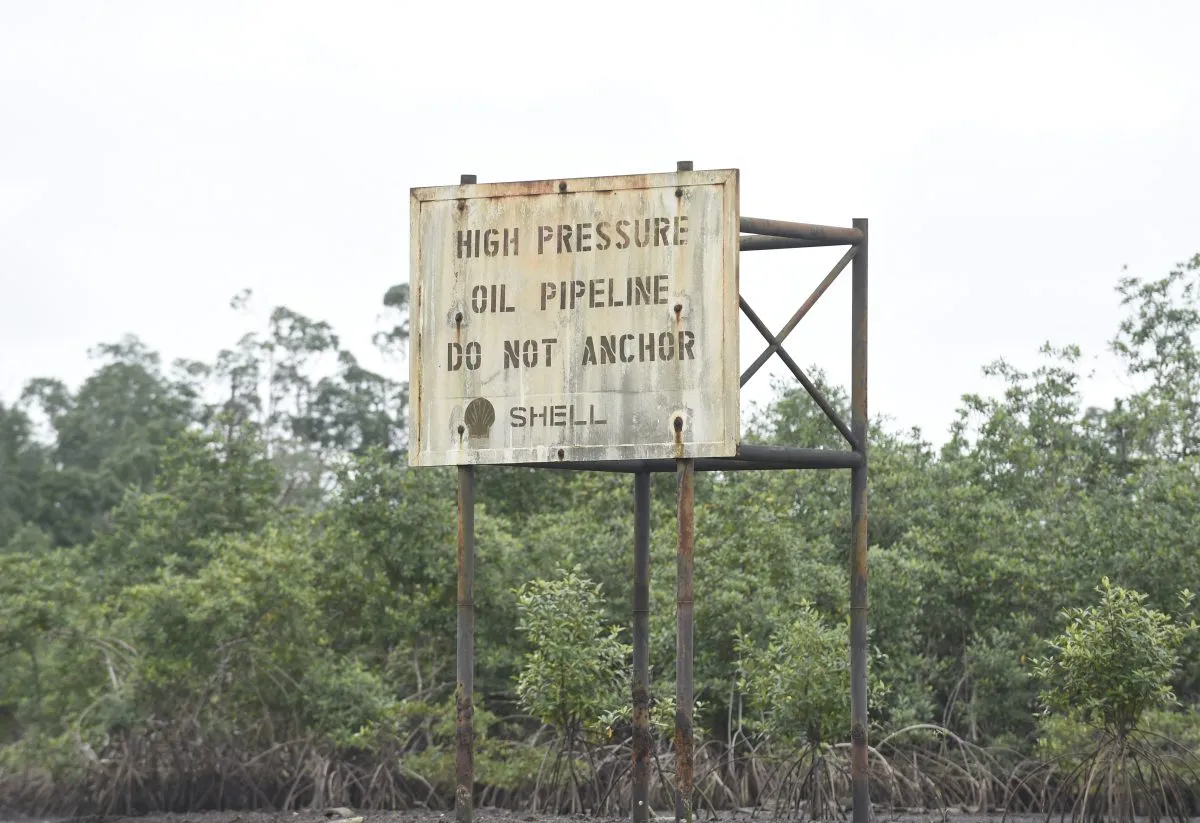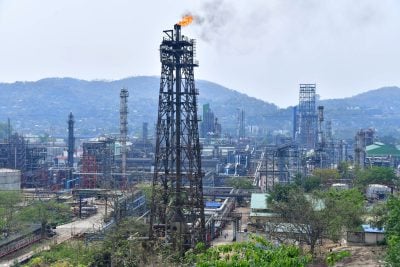After decades of operation in Nigeria, TotalEnergies is the most recent foreign oil major which plans to leave the country’s onshore oil market.
The French energy company intends to sell its 10% stake in the Shell Petroleum Development Company of Nigeria (SPDC), following Shell’s divestiture in January.
The Niger Delta, Nigeria’s main hub for oil production, is often tagged as the world’s largest oil-polluted region. Every year, thousands of leaks occur as a result both of bad infrastructure and of sabotage. These imperil efforts by international oil companies (IOCs) to meet environmental and social regulations. The Nigerian Extractive Industries Transparency Initiative (NEITI) serves as the industry’s ombudsman.
It claims that persistent problems with oil theft and vandalism were among the causes of a progressive withdrawal from the downstream sector by IOCs and other large companies. The federal government’s Nigerian Upstream Petroleum Regulatory Commission (NUPRC) in March 2022 estimated that from January 2021 to February 2022 more than $3.3bn was lost to crude oil theft.
“Fundamentally it’s because producing this oil in the Niger delta is not in line with our [health, security and environmental] policies, it’s a real difficulty,” TotalEnergies’ chief executive Patrick Pouyanné said during the company’s annual results presentation.
NUPRC in May said that the country has seen assets valued at $21bn divested, as the nation’s annual upstream capital expenditures plummeted from $27bn in 2014 to less than $6bn in 2022 – a 78% decrease. Oil companies face the additional risk that communities demanding monetary recompense for damage and lost livelihoods may be able to pursue justice for past oil spills. Recent developments in Dutch and UK courts may strengthen the communities’ cases.
Rush to the exit
TotalEnergies is not the only big name departing the onshore scene. At the start of this year, Shell declared that it had reached an agreement to its 30% share in Shell Petroleum Development Company (SPDC) of Nigeria to a consortium of five businesses, four of them local, known as Renaissance. Shell will loan the consortium $1.2bn to cover funding requirements, and will provide additional finance of $1.3bn to fund SPDC’s share of a joint venture with the government’s Nigerian National Petroleum Corporation (NNPC) and other oil companies to supply the Nigeria Liquid Natural Gas (NLNG) plant, as well as its share of specific decommissioning and restoration costs.
Meanwhile, Norwegian major Equinor triggered the sale of its Nigerian operations to Chappal Energies, a Nigerian energy firm. With the transaction, the Norwegian energy company’s three-decade direct collaboration in Nigeria comes to an end. During that time, the business extracted over a billion barrels of crude oil from the Agbami field. In September, Italy’s Eni agreed to sell its Nigerian onshore subsidiary Agip Oil Company to local company Oando.
Enter the locals
The divestitures are providing an opportunity for local firms to develop the onshore market. These are more likely to hire local talent, giving Nigerians the opportunity to advance to high-ranking positions in the oil and gas industry and boosting to the domestic corporate sector as they step into the void. Seplat Energy, listed on the Nigerian Stock Exchange (NGX) and the London Stock Exchange, has seen its share price trading at an all-time high this year while its market valuation is over $1bn at the time of writing.
Roger Brown, CEO of Seplat Energy, says that oil majors for many years scaled back on their onshore investments in Nigeria, a result of local challenges and the competition from IOC assets in other countries. The dual-listed energy firm recently agreed to purchase ExxonMobil’s shallow-water oil assets. However, due to opposition from the NNPC, the transaction has not yet been finalised.
Gbenga Komolafe, chief executive of NUPRC, says that Nigerian companies are now generating an increasing proportion of gas and crude oil production.
“Remarkably, I’m proud to say that indigenous companies contribute about 30% of crude oil and 20% of gas production, as well as 40% and 32% of oil and gas reserves, respectively.”
Consultancy Westwood Global Energy Group says that the upcoming years will present an exceptional chance for indigenous oil companies to take the lead in onshore and shallow-water exploration, with drilling and production likely to increase at least to the end of this decade. However, there are also downsides to the IOC exit. In some cases international oil services companies are also heading to the exit door: under the umbrella of the Independent Petroleum Producers Group, indigenous oil and gas producers have expressed concern about their departure because of “strict” local content standards in the country’s upstream petroleum sector.
Concerns have also been raised about the competence of local oil corporations, which are sometimes taking over with fewer resources and less experience. There are indications that the environmental, social, and governance performance of onshore fields may deteriorate further, which means that communities will continue to suffer challenges but may have less avenues available to them to pursue justice, in particular access to international tribunals.
Massive pollution persists across the country despite the departure of IOCs. Reports from the Environmental Defense Fund show a critical increase in gas flaring and leaks since Nigerian companies took over. Flaring includes the combustion of excess gas from oil wells. And, according to data obtained from the Stakeholder Democracy Network (SDN), overseas corporations account for 35% fewer oil spills than Nigerian companies. The SDN also reports that local energy companies tend to flare far more gas per barrel of oil than do foreign oil corporations. According to the analysis, domestic enterprises flare more than ten times as much gas per barrel of oil produced.
Offshore trend
Still, the departure of IOCs from onshore does not mean they are exiting the country altogether. Offshore sites – which lack the security challenges of onshore – are increasingly attractive to the majors. The government’s Department of Petroleum Resources says that about 13bn of Nigeria’s 37bn barrels of proven oil reserves were in the deepwater sector. TotalEnergies has pledged to invest, with a focus on offshore oil projects and gas production.
“Mr. President, we are ready to invest $6bn in the coming years. We are looking extensively at more deepwater production and gas production opportunities across the terrain. We welcome your policies and your personal commitment to ensuring that all required fiscal incentives are provided while security issues are tackled. Everything is here. We just need to conclude with the tweaks and changes necessary to unlock the outstanding potential in both oil and gas,” chief executive Pouyanné said in a meeting with Nigerian President Bola Tinubu.
Shell is looking at a $5bn offshore oil investment opportunity in Nigeria’s Bonga North offshore project, and has pledged to spend a further $1bn in five to 10 years to boost natural gas output for domestic supplies and exports, according to a Nigerian presidential spokesman. It has also invested in solar power solutions in the country.
President Tinubu said that there were plans afoot to entice international investors in both offshore and onshore fields, with the transition to natural gas a clear priority.
“The moment I took over, there was a clear path that we set out to pursue, and we will ensure that Nigeria remains a top-level investment choice in the dynamics of the offshore and onshore sectors. We will review troublesome areas, fiscally and otherwise, to incentivise gas production in the age of transition to cleaner energy. We are ready to make a difference as a government. The good handshake that we have is for partnership and to accelerate and incentivise gas production in pursuit of the energy transition.”
Want to continue reading? Subscribe today.
You've read all your free articles for this month! Subscribe now to enjoy full access to our content.
Digital Monthly
£8.00 / month
Receive full unlimited access to our articles, opinions, podcasts and more.
Digital Yearly
£70.00 / year
Our best value offer - save £26 and gain access to all of our digital content for an entire year!
 Sign in with Google
Sign in with Google 



